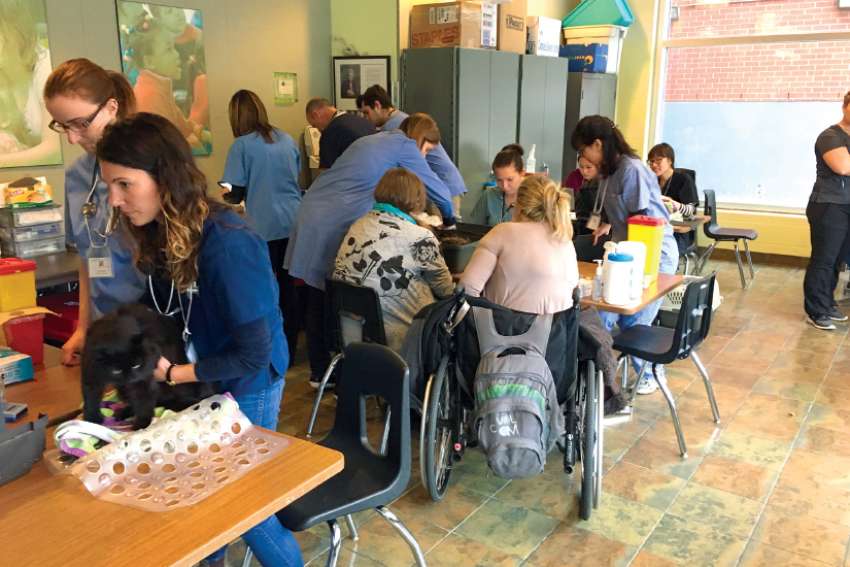Now, 12 years on, she is a reminder to those still on the street that escape from the vice-grip of addiction is possible, and hopelessness does not need to have the final word. Her work as a housing support worker takes her to the front lines of homelessness, in support of those who have managed to find housing, but because of their mental illness or addictions are always on the verge of relapse to the streets.
We passed a young man sitting on the steps of a church, huddled with his large Bernese Mountain dog which paid more attention to us than the owner did. We had seen him in the distance a few hours earlier and that memory was enough for Tracey to don her support worker hat.
“What are you doing out on a night like this?” Tracey asked. The young man said that he had been locked out by his so-called friends and they would not let him back into the house they shared. “Well, this is not right,” she continued. “Maybe you can keep warm but what about that poor dog of yours? It looks like he has been dragged around the street all night. He can hardly walk, for crying out loud.”
It was not long before she had handed him her card and told him to call her in the morning and she will see what alternative assistance she can set him up with so that he and his dog are not dependent on “friends.”
It’s surprising how many people on the street seem to have a dog in tow. Often bedraggled and looking like it would rather be anywhere else, it follows faithfully, tirelessly. Perhaps it encourages passers-by to donate to its owner, since we have the lurking suspicion that somehow the owner has a choice in life, but the dog does not. They are a bulwark against street culture that hardens the heart with the mantra, “Never say you are sorry, never look anyone in the eye and, most importantly, never trust.”
Studies have shown that a companion animal can assist people to remain in housing and to maintain some form of dignity because of the mutual love between human and pet.
To support this bond, a remarkable outreach clinic was opened in Toronto’s Yonge Street Mission seven years ago by veterinarian (and my son) Dr. Mark Kinghorn. Walk by when it is open and you will see seven vet stations set up, each with its own veterinarian and vet assistant, responding to clients and pets with the respect and care.
The clinic is held six Saturdays per year and all services are free to those who are recommended through their social worker. Each half hour appointment includes examination, vaccination, treatment for parasites and microchipping. Then, if requested, the pet is booked for an appointment at the new spay/neuter clinic at the Toronto Humane Society. Animal food suppliers step up to ensure that each owner walks away with a free bag of food for their pet.
This is the veterinarian community giving back their time and talents to the parishioners of the Church on the Street so that in the hardships of the street, there is at least one being that radiates unconditional love and in a small way reminds them that they are loved by God.
None of this is lost on the clients. When asked what it means to them, their responses always focus on the mutual dependency that exists. Comments such as this are not unusual: “I haven’t had a vet for at least 12 years. … Money’s tight and this is something that’s really important. …My dog is the reason I stay calm and alive. He keeps me active and fills my days so I can go on. … He is the only thing that I trust and has a love that never lets me down.”
In the darkness of the downtown streets, trust and love are in short supply and are usually served cold. However, as we watched our new friend disappear into the distance, his faithful companion brought a warmth and attentiveness that I think St. Francis would have approved of.
(Kinghorn is a deacon with the Archdiocese of Toronto: robert.kinghorn@ekinghorn.com)


